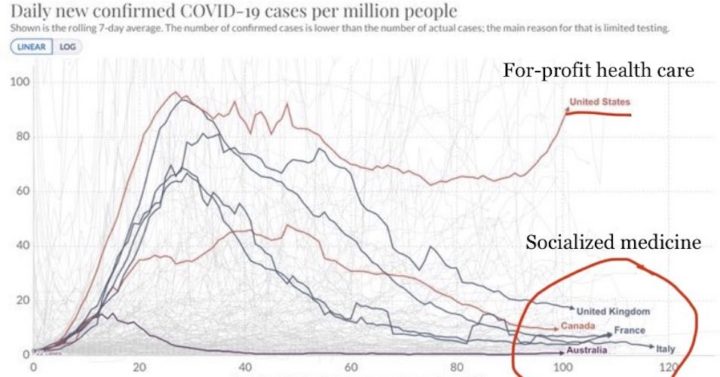“All countries successfully combatting this virus have robust public health systems, which provide for coordination of effort.”
By Eoin Higgins
A recent rise in cases of Covid-19 and the overt failure of the for-profit healthcare system throughout the pandemic in the U.S. are making the case for Medicare for All, advocacy groups and activists say, as countries with socialized systems see their infection rates decline.
“All countries successfully combatting this virus have robust public health systems, which provide for coordination of effort,” remarked a popular healthcare advocate who uses the @AllOnMedicare handle on Twitter.
Your public health leaders have the awesome public health framework of a single-payer health care system. Leadership matters, but leaders need tools — and all countries successfully combatting this virus have robust public health systems, which provide for coordination of effort. https://t.co/69dksZrHSh
— Medicare for All (@AllOnMedicare) June 25, 2020
Calls for the U.S. to adopt a single-payer heathcare system have increased as the pandemic has raged around the country. Cases and deaths in the U.S are now the highest in the world, a result critics blame on both the private healthcare system and the mismanagement of the crisis by President Donald Trump.
Public Citizen’s health care policy advocate Eagan Kemp told Common Dreams that the current for-profit healthcare system that has driven millions of Americans in to bankruptcy and leaves millions more without care will only continue to exacerbate the pain of the outbreak.
“While no health care system can completely protect a country from Covid-19, the U.S. has failed to respond for a number of reasons, not least of which is a for-profit health care system where Americans are too afraid to go to the doctors for fear of the cost,” said Kemp. “Far too many Americans will face medical debt and even bankruptcy if they are lucky enough to survive getting Covid-19, something unheard of in all other comparably wealth countries.”
In a shocking turn of events, it appears that free health care is good during a pandemic. https://t.co/djMFI3nIWV
— Public Citizen (@Public_Citizen) June 25, 2020
As University of Massachusetts professor Dean E. Robinson wrote in a piece that appeared at Common Dreams earlier this month, the coronavirus is impacting people of color at a disproportionate rate in cities and communities nationwide—a dynamic that bolsters the call for a universal Medicare for All program to help close those gaps.
“The obvious and immediate need of Black and other working class populations caught in the teeth of the pandemic is the right to health care treatment without the burden of cost,” wrote Robinson. “Even before the pandemic, lower-income, Latino, and younger workers were more likely to be uninsured. Undocumented workers had the highest rates of uninsurance.”
On June 18, Ralph Nader in an opinion piece for Common Dreams expressed his hope that the ongoing pandemic would make essential workers in the health field “the force that can overcome decades of commercial obstruction to full Medicare for All.”
“The Covid-19 pandemic and its bungling by Trump and Trumpsters leading to the loss of loved ones, the loss of patients, and the horrific experiences of frontline workers would pave the way to this long-overdue change,” wrote Nader. “The humane laser-beamed arrival of workers, who have witnessed the tragedies caused by the pandemic will push Congress to provide Americans universal care and relief, from economic anxiety, dread, and fear.”
Kemp in his comments to Common Dreams warned that the effects of the pandemic on the U.S. economy and public health would continue without a drastic change in political leadership.
“The Trump administration has utterly failed and continues to refuse to take necessary steps to address this crisis,” said Kemp. “As a result, Americans will continue to get sick and die at much higher rates. While all of this is happening, Mitch McConnell is holding up critical additional stimulus funding unless businesses are granted immunity from liability for coronavirus-related lawsuits that enable workers, consumers, and patients to hold companies accountable through the civil justice system.”






